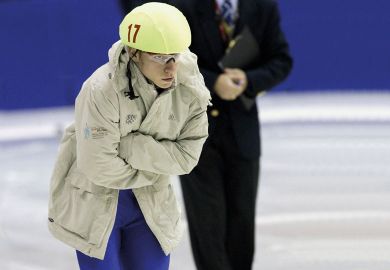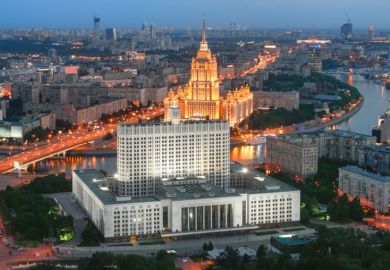Russian institutions are leading the charge in cracking down on student opposition to the Kremlin’s war on Ukraine, with hundreds of students estimated to have been expelled already.
With Russian academia increasingly cut off from the outside world, student dissidents are finding themselves targeted by the very institutions tasked with nurturing their critical thinking.
On 9 March, Russia’s Ministry of Internal Affairs reportedly ordered Saint Petersburg State University to expel 13 students who participated in anti-war protests, in what academics have said is an escalation of the crackdown on free speech.
While no official figures exist, hundreds of students have likely been expelled for their opposition to the war, estimated Vladimir Ashurkov, a Russian activist and executive director of the Anti-Corruption Foundation, a Moscow-based non-profit established by opposition politician Alexei Navalny.
Mr Ashurkov, who now coordinates the Freedom Degree project, which fields queries from students facing expulsion, told Times Higher Education that the initiative has been flooded with requests in recent weeks.
“Many of the letters we receive begin with: ‘I’m very scared,’” he said. “Some of them are trying to challenge the expulsion and to re-enrol; some of them are looking for opportunities to transfer to another university, including foreign options; some of them are just shocked and frustrated, but all of them need advice and moral support.”
Even at universities that stop short of expelling students, scare tactics are “blatant and offensive, and they target the brightest and most promising students” – students are being rejected by supervisors, fired from laboratories and told they’ll face problems defending their theses, he said.
Mr Ashurkov noted one case in which students were told they should apply for academic leave in order to “volunteer to help rebuild the destroyed cities of Ukraine, because it will help their protest energy to find a better use”. In another, a female student was advised to get married quickly to change her Ukrainian surname.
He described administrators as zealous in their pursuit of offenders: “We have the impression that university managers are playing the key role in the attempts we’re seeing to silence students – not an order from above.”
Dmitry Dubrovsky, a professor at the School of Higher Economics (HSE) University in Moscow, said that many Russian universities have been scouring social media to identify anti-war students and pressure them to remove so-called anti-patriotic posts.
Universities are increasingly taking “extraordinary measures” – escalating their response from warning talks with students to making “direct threats”, said Professor Dubrovsky.
Expulsion is far from the worst outcome for those who speak out, academics noted. Those in Russia who challenge the Kremlin’s version of facts about its “special operation” in Ukraine face up to 15 years behind bars. Across Russia, more than 15,500 people have been detained for anti-war actions since 24 February, according to data from human rights project OVD-Info.
“Young people lose years being under arrest. They even cannot physically complete their studies or research, and often they are immediately expelled under any pretext,” said Mr Ashurkov.
Daniel Munier, a senior advocacy officer at the non-profit group Scholars at Risk (SAR), said that recent actions taken by universities against Russian students “appear to be a continuation of the state’s policy of quashing dissent”.
In January 2021, Astrakhan State University expelled three students for participating in a protest in support of Mr Navalny. In October 2020, Russian prosecutors ordered the Presidential Academy of National Economy and Public Administration to provide data on students allegedly involved in protests.
And Mr Munier was pessimistic such incidents would stop any time soon. “I worry that we may be far from seeing this wave crest,” he said.
POSTSCRIPT:
Print headline: Russia punishes anti-war stance with expulsions
Register to continue
Why register?
- Registration is free and only takes a moment
- Once registered, you can read 3 articles a month
- Sign up for our newsletter
Subscribe
Or subscribe for unlimited access to:
- Unlimited access to news, views, insights & reviews
- Digital editions
- Digital access to THE’s university and college rankings analysis
Already registered or a current subscriber?








